Anatoliy Golitsyn – New Lies for Old – 13.2: First Disinformation OP: The Soviet-Yugoslav "Dispute"
Support:
paypal.me/mario1337
BTC: 35iDtUzZq33CoJhmK38TdV9Xunvs7TKmzX
ETH: 0xf396A0e10911b4BC975CfE80117412D484B24d1e
The Author, a former KGB operative, defector, lays out in detail the art of disinformation. He details the history, how the communists used it, gives historical examples and helps one understand the problem we face every day. The value of reading this book is to see how 'disinformation' is used in our lives today.
The First Disinformation Operation:
114 — Further Anomalies in the "Dispute"
118 — Objectives of the Soviet-Yugoslav Dispute of 1958-60
http://www.doomedsoldiers.com/pdfs/new_lies_for_old_golitsyn.pdf
Notes
Chapter 13: The First Disinformation Operation: The Soviet-Yugoslav "Dispute" of
1958-60
1. Pravda, June 4, 1958.
2. The author was a subordinate of Grigorenko in the Counterintelligence
Department in 1951. On one occasion in December 1959 Grigorenko visited the
Information Department, where the author was then working, seeking staff with
expertise on Yugoslavia and Albania for service in his department. The nature of this
quest obliged Grigorenko to give information on the kind of work for which the
officers were required. The information on Pushkin's involvement in this operation
was confirmed to the author independently by another KGB officer, Kurenyshev.
3. Georgiy Maksimovich Pushkin, Soviet diplomat since 1937, ambassador in East
Germany until the beginning of 1958, with previous experience in Hungary, Sinkiang,
and Middle East affairs. Listed officially as Deputy Minister of foreign affairs from
1959.
4. Yugoslav Facts and Views, no. 56, 1958.
5. CSP, Leo Gruliow ed., (New York: Frederick A. Praeger, 1959), vol. 3, p. 62.
Khrushchev stated: "On many questions of foreign policy we speak a common
language."
6. History of the Communist Party of the Soviet Union, English ed. (Moscow:
Foreign Languages Publishing House, 1960), pp. 701-2.
7. Ibid., p. 641: "Subsequently, the Communist Party of the Soviet Union, on its
own initiative, took steps to restore norma] relations between the USSR and
Yugoslavia.
"The policy of friendship and mutual assistance, pursued by the CPSU, triumphed.
The mistakes made occasionally in the relations with fraternal countries were of a
secondary, accidental character. The essence of these relations was genuinely
Socialist, and accorded fully with the principles of proletarian internationalism. The
CPSU directed all its efforts to strengthening friendship with People's China and the
other People's Democracies, and this policy was entirely successful. The joint
activities of the CPSU and the other Communist Parties standing at the helm of their
respective States, resulted in the establishment of a fraternal community of Socialist
countries, and no amount of intrigue on the part of their enemies could, or can, shake
their solidarity and unity. This unity is a source of the strength of the Socialist camp. .
. The problem of relations between the Socialist countries was, for all its complexity
and novelty, successfully solved in the interests of each country and of the entire
Socialist camp."
8. CSP, vol. 3, pp. 68-69,
9. GSE (1961), p. 374
-
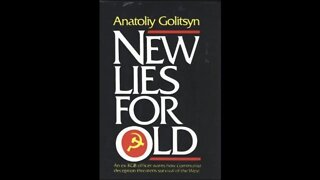 20:12
20:12
Eugen Richter Audiobooks
2 years agoAnatoliy Golitsyn – New Lies for Old – 14.2: The "Evolution" of the Soviet Regime
274 -
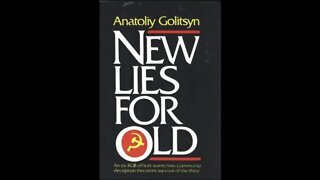 20:24
20:24
Eugen Richter Audiobooks
1 year ago $0.02 earnedAnatoliy Golitsyn – New Lies for Old – 19.1 – "Democratization" in Czechoslovakia in 1968
77 -
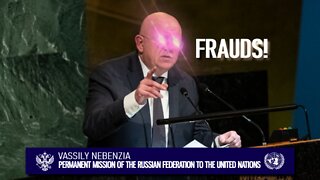 15:21
15:21
The Inconvenient Truth!
1 year agoRussian UN Rep. Vassily Nebenzia DESTROYS The UN FRAUDS & Hypocrites!
256 -
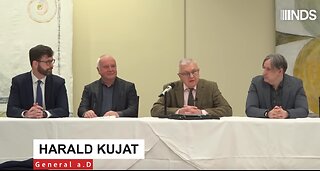 41:55
41:55
InnerLight
3 months agoEx-NATO Official Harald Kujat on the Ukraine War & Geopolitical Change and Destroys the False Pro-War Narrative of the Neocons - February 16, 2024
9221 -
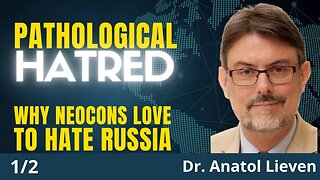 18:30
18:30
NeutralityStudies
9 months ago $0.02 earnedNeocon Hate For Russia Makes A European Settlement With Moscow Impossible Dr. Anatol Lieven (1/2)
77 -
 1:00:47
1:00:47
Silicon Curtain Podcast
1 year ago $0.01 earnedAndrei Soldatov - How GULAG Economics and Repression is Dragging Russia Back to Worst Days of USSR
134 -
 0:59
0:59
illuminateconfirms
1 year agoThe Gov Is Lying To You AGAIN | #NATO #Ukraine #Russia #JRE #JoeRogan
65 -
 8:33
8:33
The Dive With Jackson Hinkle
11 months agoNEWEST Putin Propagandist EXPOSES Ukraine Lies
2.94K15 -
 53:03
53:03
Silicon Curtain Podcast
8 months agoJames Sherr - Russia’s Sovereignty is not Directly Threatened so Why is Putin Embracing Total War?
21 -
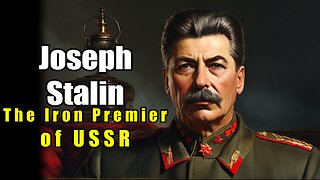 4:20
4:20
100 Historical Figures
4 months agoJoseph Stalin - The Iron Premier of USSR (1878 - 1953)
186